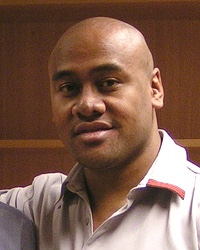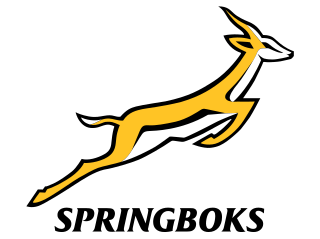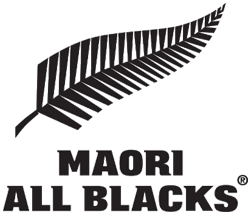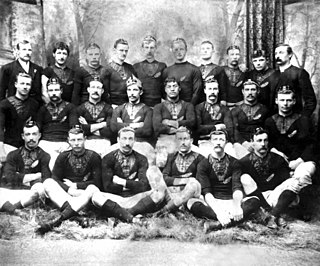Related Research Articles

The New Zealand national rugby union team, commonly known as the All Blacks, represents New Zealand in men's international rugby union, which is considered the country's national sport. Famed for their international success, the All Blacks have often been regarded as one of the most successful sports teams in history.

Jonah Tali Lomu was a New Zealand professional rugby union player. He is widely regarded as one of the greatest and most influential players in the history of the sport, and as one of the most talented sportsmen ever. Lomu is considered to have been the first true global superstar of rugby, and consequently had a huge impact on the game.

The South Africa national rugby union team, commonly known as the Springboks, is the country's national team governed by the South African Rugby Union. The Springboks play in green and gold jerseys with white shorts, and their emblem is the Springbok, a native antelope and the national animal of South Africa. The team has represented South African Rugby Union in international rugby union since 30 July 1891, when they played their first test match against a British Isles touring team. Currently, the Springboks are the reigning World Champions, having won the World Cup a record four times. South Africa are the only team to have won half of the Rugby World Cups they have participated in, and are also the second nation to win the World Cup consecutively.

New Zealand Rugby (NZR) is the governing body of rugby union in New Zealand. It was founded in 1892 as the New Zealand Rugby Football Union (NZRFU), 12 years after the first provincial unions in New Zealand. In 1949 it became an affiliate to the International Rugby Football Board, now known as World Rugby, the governing body of rugby union for the world. It dropped the word "Football" from its name in 2006. The brand name New Zealand Rugby was adopted in 2013. Officially, it is an incorporated society with the name New Zealand Rugby Union Incorporated.

Daniel William Carter is a New Zealand retired rugby union player. Carter played for the Crusaders in Super Rugby and for New Zealand's national team, the All Blacks. He is the highest point scorer in test match rugby, and is considered by many experts as the greatest ever first five-eighth (fly-half) in the history of the game. He was named the International Rugby Board Player of the Year in 2005, 2012 and 2015.

Hamilton Boys' High School is a boys' secondary school in Hamilton, New Zealand and is the largest secondary school in the Waikato region. The school was established as Hamilton High School in 1911 but was later split into separate boys' and girls' schools, with the current school opened in February 1955. Its sister school is Hamilton Girls' High School. The school crest features a lion, sash and star, and bears the motto "Sapiens Fortunam Fingit Sibi" which translates to "a wise man carves his own fortune". The school colours are black and red.
The All Blacks XV is the second national rugby union team of New Zealand, after the All Blacks. New Zealand's second national team has had numerous names in its history: Junior All Blacks, New Zealand XV, New Zealand A, New Zealand B, All Blacks XV.

Rugby union has been played in New Zealand since 1870 and is the most popular sport in the country as well as being the de facto national sport. In a 2023 survey, 75% of respondents said they followed the sport.

The Māori All Blacks, previously called the New Zealand Maori, New Zealand Maoris and New Zealand Natives, are a rugby union team from New Zealand. They are a representative team of the New Zealand Rugby Union, and a prerequisite for playing is that the player has Māori whakapapa (genealogy). In the past this rule was not strictly applied; non–Māori players who looked Māori were often selected in the team. These included a few Pacific island players and a couple of African descent. Today all players have their ancestry verified before selection in the team.
The Cavaliers was an unofficial New Zealand rugby union team which toured South Africa in 1986. Because of the Apartheid policies of the South African government, the official New Zealand Rugby Union tour scheduled for 1985 was cancelled, and the Cavaliers tour was very controversial in New Zealand.

The New Zealand national under-20 rugby union team, nicknamed the Baby Blacks, is the representative rugby union team from New Zealand. It replaced the two former age grade teams, the under-19s and the under-21s. Their first tournament was the 2008 IRB Junior World Championship, which they won after defeating England (38–3) in the final. They have gone on to also win the World Rugby Under 20 Championship in 2009, 2010, 2011, 2015 and 2017. The New Zealand under-20s have been nicknamed the "Baby Blacks" after the youthful All Blacks side which played in 1986.

The first clash in Rugby Union between Australia and New Zealand took place in a test match on 15 August 1903 in Sydney, New South Wales. On that occasion, New Zealand won 22–3.

The 1893 New Zealand tour rugby to Australia was the second tour by the New Zealand national rugby union team to Australia. Ten matches were played against regional and district sides, but no Test matches were played. It was the first tour arranged by New Zealand Rugby Football Union, which had been founded the previous year. The only previous New Zealand national team was the side that toured New South Wales in 1884. Immediately before departing for Sydney, the tourists played a match against a "Combined XV" in Wellington, which New Zealand won 7–4.

Argentina and New Zealand have been playing each other in the sport of Rugby Union since 1976.

The 1907–1908 New Zealand rugby tour of Australia and Great Britain was made by a group of New Zealand rugby footballers who played matches in Australia, Ceylon, England and Wales between 1907 and 1908. Most of the matches were played under the rules of the Northern Union, a sport that is today known as rugby league. As such, the team were the immediate predecessors of the New Zealand national rugby league team. The tour had a large role in establishing rugby league in both Australia and New Zealand, and also gave birth to international rugby league. The tour party has come to be known as the professional All Blacks or All Golds, although at the time they were commonly referred to as the All Blacks—a named popularised by the New Zealand rugby union team that toured the Northern Hemisphere in 1905.

The 1921 South Africa rugby union tour of Australia and New Zealand was the third tour made by the Springboks rugby team, and their first tour to Australia and New Zealand. South Africa played three Test matches against the All Blacks. The series was drawn 1–all, and the long-running controversy between the countries over the All Blacks' inclusion of Maori players began.
The 1976 New Zealand rugby union tour of South America was a series of eight matches played by the New Zealand national rugby union team in Uruguay and Argentina in October and November 1976. The tour was entirely successful as the New Zealand team won all nine matches, scoring a total of 321 points with 72 conceded.
The 1960 New Zealand rugby union tour of South Africa, was a series of rugby union matches played by the New Zealand national rugby union team in South Africa and Rhodesia.

In 1992, the South Africa Springboks played a rugby union test match against the New Zealand All Blacks, which later became known as the Return Test. The match was played at Ellis Park Stadium in Johannesburg on 15 August 1992. It was named as the Return Test as it was South Africa's first test match since the International Rugby Football Board (IRFB) had banned them due to apartheid.
References
- ↑ Knight, Lindsay. "Stu Conn". New Zealand Rugby Union. Retrieved 23 December 2014.